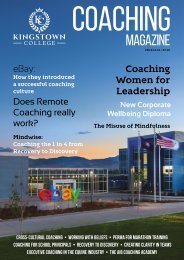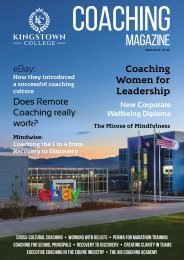Kingstown College Coaching Magazine vol.5 2019/2020
Welcome to another information filled publication of our Coaching Magazine!
Welcome to another information filled publication of our Coaching Magazine!
- No tags were found...
Create successful ePaper yourself
Turn your PDF publications into a flip-book with our unique Google optimized e-Paper software.
100 Coaching Magazine Vol.5
How the Application of a Coaching
Approach Can Facilitate the
Implementation of the Recovery
Framework in Mental Health Practice
Introduction
Within this paper, current strategic developments within Mental Health Care will be outlined.
This will be followed by a discussion on how the principles of Coaching interconnect with that
of the Recovery approach. The benefits to be gained by educating Mental Health Professionals
(MHP’s) on Coaching as a strategy to assist them in implementing the Recovery framework in
its true essence will then be discussed.
Author
Dr Patsy Mc Sharry
Qualifications: RGN; RMN; BA Nurse Education; MSC in Nursing and PhD in Health Promotion
and Health and Wellness Coach, Mental Health and Well Being Coach
Position Lecturer in Nursing and Health Studies, St Angelas College Sligo which is a college of
NUI Galway.
Concept of Recovery
The Recovery approach is firmly
established within mental health care
policy for a considerable period of time
now. Back in 2006, The Vision for Change
policy document was published which
was seen as the road map to guide Irish
Mental Health Care practice and policy
away from a traditional medical model
approach to care towards a Recovery
approach. According to Anthony (2000),
Recovery is a process; a vision; a belief
which infuses a system which providers
can hold for service users grounded on
the idea that people can recover from
‘mental illness’, and that the service
delivery system must be constructed
based on this knowledge”. Although
this approach is now embedded in
mental health policy and guidelines,
the evidence for the implementation
in practice is not as widespread as
the policy suggests. The culture of
traditional mental health practice has
been slow to change to match the
policy. In recognition of this, in 2017,
the government published a National
Framework for Recovery in Mental
Health (HSE, 2017). This framework
advocates the need for the service
user and their lived experience to
be central to the process. They also
stipulate the need for co-production
between service user and practitioners.
The framework stipulates a need for
an organisational wide commitment
to the development of a Recovery
oriented mental health service. And
the need for supporting Recovery
orientated learning and practice across
all stakeholder groups. The framework
draws on work by Leamy and Slade
(2011) who identified five processes
that people with mental health find
essential for Recovery. These processes
are “Hope” (having a belief that life will
and can get better), “Connectedness”
(within community and not being
isolated because of illness) “Identity”
(identity in life beyond that of service
user), “Meaningful Role” (building on
strengths and skills to have fulfilling
and esteem building activities in life)
“Empowerment” (having information,
choices and confidence to make
decisions on own life). Many of these
Recovery processes are encapsulated
within a Coaching approach.






